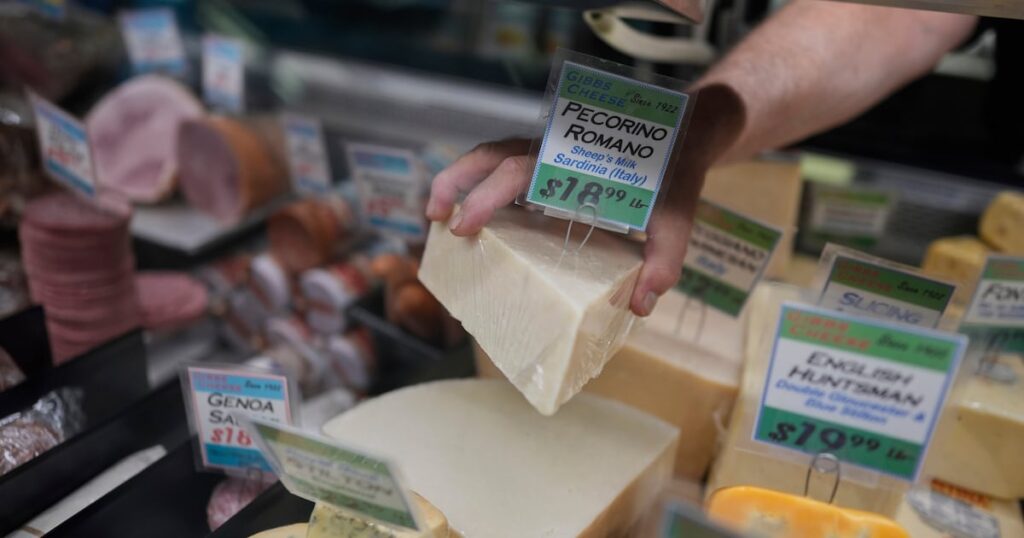
Jeff Gibbs, owner of Gibbs Cheese, reached for a Pecorino Romano cheese imported from Sardinia, Italy, at his shop in Findlay Market on Thursday, April 3, 2025, in Cincinnati. The scene highlights a long-standing curiosity: does consuming cheese lead to nightmares? This question has been woven into cultural narratives for centuries, from Ebenezer Scrooge’s ghostly encounters in “A Christmas Carol” to comic strips linking unsettling dreams to Welsh rarebit, a cheese-on-toast dish.
A recent study published in the journal Frontiers in Psychology has taken a closer look at these assumptions, examining the relationship between dairy consumption and sleep disturbances. Conducted by researchers at MacEwan University, the study surveyed 1,082 students to explore how food impacts their dreams, focusing on eating habits, food sensitivity, and sleep quality.
Study Findings: Food and Sleep Connection
The study revealed that nearly half of the participants believed certain foods influenced their sleep. While 20% reported that food improved their sleep, approximately 25% felt it worsened their sleep, and 5% noted an impact on their dreams. Notably, those who associated food with dreaming experienced more frequent and disturbing dreams.
“These new findings imply that changing eating habits for people with some food sensitivities could alleviate nightmares,” Dr. Tore Nielsen of Université de Montréal, lead author of the article, stated.
Interestingly, sweets, spicy foods, and dairy were most often blamed for poor sleep, with sweets leading at 31% and dairy at 22%. However, the study also highlighted that perceptions of worse sleep were linked to lactose intolerance and gastrointestinal symptoms, as well as late-night snacking. About 30% of those who felt their diet negatively affected their sleep were lactose intolerant.
Exploring the Role of Dairy in Sleep
The belief that dairy might trigger nightmares is not without merit, according to the study. Consuming dairy can lead to gastrointestinal disturbances, which in turn may affect the quality of sleep and dreams. This understanding opens the door for individuals with food sensitivities to potentially improve their sleep by adjusting their diets.
Dr. Nielsen pointed out that the discomfort from dairy consumption might be the real culprit behind strange or unsettling dreams, rather than the cheese itself. This insight encourages further research into how specific foods impact dreaming and sleep quality.
Foods That Enhance Sleep
While some foods are associated with poor sleep, others may actually improve it. The study found that participants who regularly consumed fruits and vegetables reported better sleep quality. Nearly 18% of fruit eaters, 12% of vegetable consumers, and 13% of herbal tea drinkers noted improvements in their sleep patterns.
“They could also explain why people so often blame dairy for bad dreams!” Dr. Nielsen added, emphasizing the potential for dietary adjustments to enhance sleep quality.
Implications and Future Research
The research underscores a significant link between diet and sleep, particularly concerning food sensitivities like lactose intolerance. However, the precise relationship remains complex and multifaceted. Poor diet might lead to poor sleep, or the reverse could be true. Alternatively, another factor might influence both.
These findings suggest that individuals experiencing sleep disturbances might consider evaluating their dietary habits. For some, this could mean reducing dairy intake or addressing food sensitivities to improve sleep quality without professional intervention.
As the conversation around food and sleep continues to evolve, this study lays the groundwork for future research to further unravel the intricate connections between diet, sleep, and dreaming. Meanwhile, those curious about their own sleep patterns might find it worthwhile to experiment with dietary changes to see if their dreams—or nightmares—are affected.







